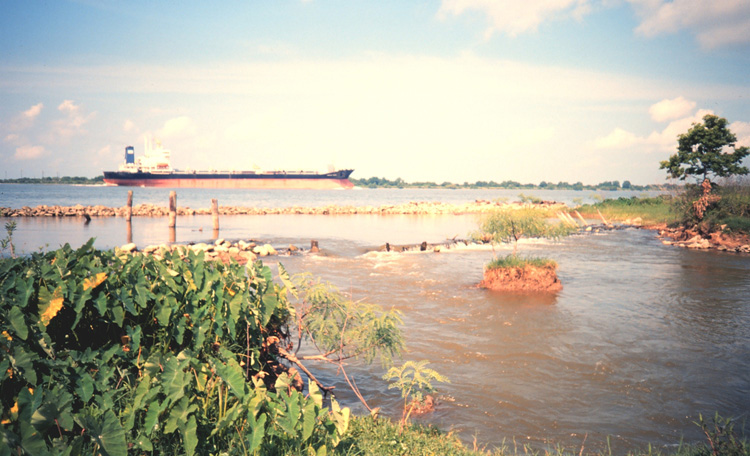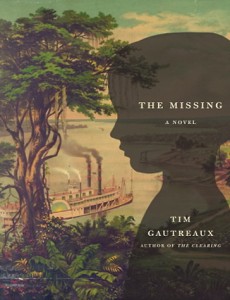You have no items in your cart. Want to get some nice things?
Go shoppingThe American roadtrip: a life-defining journey, racing along the desert highways to the leafy green of the National Parks or to the sky-scraping cities. It’s delighted writers and artists for generations — we’ve all read the books, seen the films and heard the real-life adventures along Route 66, The Big Sur and the Blue Ridge Parkway. It’s all been done before. Which is why, I think, it’s time to drive off the highway and seek adventures elsewhere. Forget On The Road; this journey is going to be along the river instead.

The Mississippi River flows for 2,348 miles from western Minnesota all the way through to the Gulf of Mexico. I was in Memphis last year and the Mississippi made quite an impression on me. That day, it seemed muddy and tranquil but despite attempts to control it, it still has the power to unleash devastating floods, as has happened this spring, and its hidden undercurrents could easily sweep one away. Unsurprisingly, many artists, musicians and writers have been lured by the power and beauty of the Mississippi and used it as their inspiration for their finest works.
Its history and stories, chronicled by authors and poets alike, are so fantastic as to have an almost mythical quality. Through the words of authors such as William Faulkner and Tennessee Williams, you can capture a flavour of the old South and can experience the length and breadth of the river from the comfort of your armchair. It may not be as life-changing as a real-life American roadtrip, but this journey through literature, and along the Mississippi, is certainly vibrant and unforgettable.
A poet who understood the importance of the Mississippi River and its significance in American culture was Langston Hughes. In his poem ‘The Negro Speaks of Rivers’, he establishes the link between human history and the river; in particular, the history of his own race and slavery. The river was, for many slaves, a symbol of both freedom and repression. Slaves were often bought and sold down the river, and yet the endless flow of the Mississippi gave them hope of an escape and a route to liberty. Hughes captures this sense of the never-ending, as well as emphasising the detachment of the river; although so intertwined with human lives, it remains cold and uncaring to their plight. The lines “I’ve known rivers ancient as the world and older than the/flow of human blood in human veins” suggests that even when all human endeavour is gone, the river runs on. You can read the poem and actually listen to Langston Hughes reading it here. I’ve always loved spoken poetry, and this recording sends shivers down my spine.

For Mark Twain’s protagonist, Huckleberry Finn, the Mississippi River represents freedom. In The Adventures of Huckleberry Finn, Huck and Jim, a black slave, travel the Mississippi on a raft, trying to escape the fetters that bind them. Mark Twain was born Samuel Clemens and grew up by the Mississippi in Hannibal, Missouri, and spent his youth working on a steamboat. As a result, the river became the backdrop to many of his most famous stories and an enduring presence throughout his work. The description of the Mississippi in the moonlight, miles-long and silent, is haunting and atmospheric, whilst the use of colloquial first person makes the novel seem authentic. It’s very easy to lose yourself in the work of Mark Twain.
In this literary journey along the river, it’s inevitable to travel from the work of Mark Twain to that of William Faulkner. Faulkner was influenced not only by Twain, whom he named “the father of American literature”, but also by the beauty and the tragedy of his homeland close to the Mississippi River. Faulkner created a fictional setting — Yoknapatawpha County — based around his real-life hometown of Oxford, Mississippi. Faulkner’s work is often violent and emotional, where human nature remains as unflinching as the river itself. Look out for The Sound and The Fury, Absalom, Absalom! but also his shorter and lesser-known fiction, such as The Bear and Old Man, the latter being the Mississippi River itself and set around the time of the great floods of 1927.
Modern authors have continued to feature the Mississippi in their writing. The novels of James Lee Burke, especially those involving the ex-cop Dave Robicheaux, are largely set in the bayou country of the Mississippi delta. On the surface, these novels might seem to be just another noir detective series but Burke is not afraid to address the issues facing the South in the last few decades, whether racial tension, extreme poverty or life post-Hurricane Katrina.

In contrast, The Missing by Tim Gautreaux, is set in the 1920s and tells the story of the abduction of a young girl and one man’s attempts to find her. Much of the novel is set aboard an old pleasure steamer that travels up and down the Mississippi and, amongst all the jazz and gambling, the River itself seems to dominate the novel.
Finally, any trip down the Mississippi would be incomplete without a visit to the city of New Orleans. In recent years, New Orleans has been making the headlines for all the wrong reasons and, after the flooding, is trying hard to get back on its feet again. Despite this, returning to authors such as Kate Chopin and Tennessee Williams preserve the once vibrant city in a golden age.
From the turn of the twentieth century, New Orleans was often seen as colourful, full of reckless, determined characters and a hotbed of independent thinking and free-living, where musicians made their money playing the brass from dusk till dawn. It was glamorous and yet sinful. It’s no wonder that it became the setting for such dramatic, radical works as Chopin’s The Awakening, and, in the 1940s, Tennessee Williams’ play, A Streetcar Named Desire.
The raucous atmosphere of New Orleans seems a world away from the descriptions of the slumbering river in Huckleberry Finn and yet all these novels are interconnected and bound together by the vast Mississippi. Writers like Twain, Faulkner and Gautreaux have told their own stories along the river, each different in tone and style but, undeniably, the Mississippi has had an impact on all of them. Their voices coexist and work together to conjure up a wonderful image of life in the American South. This image, even though taken from fiction, is based on real-life experiences and seems as clear and vivid as if it had been seen with our own eyes.




